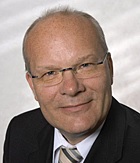AstraZeneca ($AZN) is expanding iMed, its virtual R&D project, through a cardiovascular-focused agreement with Germany's Max Planck Institute of Molecular Physiology that will focus on early-stage research.
Under the agreement, scientists at AstraZeneca's iMed satellite outpost in Mölndal, Sweden, will work alongside Max Planck researchers to study new modalities in chemistry such as stabilized peptides, macrocycles and conjugation chemistry, the partners said.
 |
| Herbert Waldmann |
The idea is to spotlight new treatment pathways by better understanding the underlying biology behind cardio ailments, and the iMed model matches a small team of AstraZeneca scientists with external experts, in this case led by Max Planck Professor Herbert Waldmann. The work will ideally help AstraZeneca discover new targets in its three areas of focus in cardiovascular and metabolic disease: cardiac regeneration, diabetes and diabetic nephropathy.
"This novel concept for a strategic alliance between an innovation-driven pharmaceutical company and a leading biomedical institute like the Max Planck Institute of Molecular Physiology promises to break new ground for drug discovery," Waldmann said in a statement. "AstraZeneca is one of the leading global pharmaceutical companies and we are pleased and very much looking forward to the collaboration. Uniting our strengths will give rise to novel innovative approaches to drug discovery."
For AstraZeneca, the deal is a reminder of its commitment to finding new ways of conducting research. The company launched iMed in 2012 with an initial focus on neuroscience, a high-stakes field that had long bedeviled its drug developers. After cutting about 2,200 R&D jobs early that year, the drugmaker heralded iMed and its hyperefficient structure as the way forward for its efforts in the space, and AstraZeneca expanded the program into oncology earlier this year through an agreement with the Korea Health Industry Development Institute.
And the company's R&D future lies in similar dealmaking, risk-sharing and broad collaboration, Executive Vice President Mene Pangalos has said. AstraZeneca is in the process of unloading another 1,600 jobs over the next few years as it abandons many of its far-flung R&D operations and consolidates in the biopharma hub of Cambridge, U.K., planning to move into the $500 million campus by 2016.
- read the statement